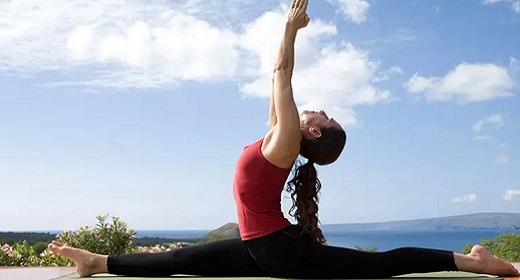by Jennifer D’Angelo Friedman: Nicki Doane shares 4 ancient codes of conduct from the Yoga Sutras that seem to be out of fashion right now but she thinks should make a comeback…

You probably don’t have too many yogi friends that practice celibacy, but brahmacharya isn’t the only “rule” from yoga philosophy that’s been left behind like a pair of worn-out old leggings, says Nicki Doane, co-owner and director of Maya Yoga Studio in Maui. Here are 4 ancient codes of conduct from the Yoga Sutras that seem to be out of fashion right now—and why Doane thinks they should make a comeback.
1. The Outdated Rule: Brahmacharya (Celibacy)
Brahmacharya, or celibacy, is the most misunderstood “rule” of all, Doane says. “It gets defined as celibacy, as in not having sex, but that’s definitely not what it is,” Doane says. “It really means being moderate in all things.” When the yamas and niyamas were created, refraining from sex had its place, Doane says, though it probably applied more to the sadhus (holy men).
The Modern Update: Moderation in all things
But the more modern concept of Brahmacharya—moderation in all things—is arguably more important today than ever before. “It’s the only sustainable path,” Doane says. “People tend to gravitate to the extreme end of things. Even in asana, with people on Instagram doing crazy poses with absolutely no foundation and getting hurt and blaming yoga. Or hot yoga—I don’t think yoga is healthy when the room is 105 degrees.” In diet, moderation is also important, whether you’re not eating (eating disorders) or eating to excess, Doane says. “You should eat what makes you feel good, and gives you the energy to do the things you want to do. If you eat a bunch of crap, you’re not going to feel that good,” Doane says, adding that once in a while, a hot fudge sundae or a couple of glasses of wine are perfectly OK.
2. The Outdated Rule: Satya (Truthfulness)
Satya, or truthfulness, seems to be a lost art right now, even in yoga, Doane laments. “It’s really important for me, being honest in yoga. One of the things yoga gives us is the ability to get quiet enough to hear what’s going on inside of ourselves. Modern yoga—whether it’s the music or hot yoga or Instagram yoga—doesn’t feel like yoga to me. Yoga is introspection.”
The Modern Update: Tune in to your truth
“There is this voice inside ourselves—it’s like tuning a radio—and 99 percent of the time the voice is telling us the truth (if you get quiet and introspective enough to hear it),” she says. “When you add all this stuff on top of the experience, it’s very hard to get quiet enough to listen to that intuitive voice. You do yoga to develop or reawaken that sixth sense.” Try taking away the distractions and see what’s underneath.
3. The Outdated Rule: Asteya (Non-stealing)
Asteya means non-stealing, but can also be interpreted to mean not taking undeserved credit. And that’s a rule today’s yoga teachers sometimes forget to follow, Doane says. “We can’t reinvent the wheel—yoga has been around for a long time. We can add our own flavor and personality, but we didn’t invent this stuff. Somehow we think we’re the authors…We feel this need to build ourselves up.”
The Modern Update: Not taking undeserved credit
“One thing I always admired about Eddie Modestini [Doane’s co-owner of Maya Yoga Studio] is that when he’s teaching, he always acknowledges where he learned what he learned,” she says. “Giving a nod to your teacher or teachers doesn’t make you look like less, it makes you look like more.”
4. The Outdated Rule: Saucha (Purity of Being)
Saucha means purity of being, or literally, being clean—and this doesn’t only mean showering after yoga, Doane explains.
The Modern Update: Being clean before yoga practice
“Today, this can translate as, ‘Hey, how about a shower before yoga?’ Especially if you come to yoga in the morning,” Doane says. “I know a lot of people come to yoga after work, and most people won’t shower before yoga, they will afterward, but there is this idea that you should be clean, and your yoga clothes should be clean. I teach in Maui where it’s hot and there are a lot of hippies, and years ago, people were coming to class and they weren’t clean, and students were telling me they didn’t want to be next to them. I tried to use humor—I said, ‘If you don’t come in here clean, I’m not going to want to touch you. If you want attention from me and an adjustment, you’re going to come clean.'” It’s about self-respect, and respecting your fellow students, your teacher, and the practice.
























































